Brad Pitt, whose career spans several decades, stands as a testament to his enduring appeal and versatility as an actor. With a filmography that encompasses a broad range of genres—from the psychological depths of Se7en to the nostalgic charm of Once Upon a Time in Hollywood and the innovative narrative of Moneyball—Pitt has consistently showcased his ability to adapt to and excel in diverse roles.
His performances, characterized by their depth, intensity, and complexity, have garnered both critical acclaim and commercial success, affirming his status as one of Hollywood’s most respected talents.
Pitt’s journey through cinema is marked by a deliberate choice of roles that challenge conventional storytelling, whether through the exploration of human psychology, the intricacies of historical events, or the subtleties of personal relationships.
His portrayal of characters such as the enigmatic Tyler Durden in Fight Club, the cunning Rusty Ryan in Ocean’s Eleven, and the resilient Billy Beane in Moneyball highlight his range and commitment to the craft of acting.
These characters, each distinct and memorable, showcase Pitt’s ability to convey a wide spectrum of human emotions and experiences, making him a relatable and compelling presence on screen.

Beyond his performances, Pitt’s influence extends to his work as a producer, where he has been instrumental in bringing to life stories that provoke thought and conversation. His dedication to the art of storytelling is evident in the projects he chooses to support, often focusing on themes of significance and relevance to contemporary society. This aspect of his career underscores a deeper understanding of cinema’s power to reflect, critique, and inspire.
Brad Pitt’s legacy in the film industry is not merely a collection of successful movies but a reflection of a career dedicated to exploring the human condition in all its complexity. Through his diverse roles, Pitt invites audiences to explore themes of love, loss, ambition, and redemption, providing a window into the myriad ways in which we connect. His contributions to cinema, marked by a body of work that continues to inspire and captivate, have cemented his status as a luminary in Hollywood, whose impact on the industry and audiences around the world will be felt for years to come.
1. Fight Club (1999) – A Deep Dive into Chaos and Identity
Fight Club, directed by David Fincher and based on Chuck Palahniuk’s novel of the same name, stands as a monumental film in Brad Pitt’s career, as well as in the landscape of late 20th-century cinema. Released in 1999, it presents a darkly satirical analysis of consumer culture, masculinity, and identity, themes that resonate profoundly with audiences even decades after its release. Brad Pitt’s portrayal of Tyler Durden, an enigmatic soap salesman who becomes the co-founder of Fight Club, is often considered one of his most iconic roles.
The Enigma of Tyler Durden
Tyler Durden is introduced as a charismatic, anarchistic figure—a stark contrast to the film’s unnamed narrator, played by Edward Norton, who represents the disillusioned everyman of the consumerist 1990s. Pitt’s portrayal of Durden is both alluring and menacing, embodying the primal urge to reject societal norms and embrace chaos. His performance captures the complexity of a character who is at once a figment of the narrator’s imagination and a vivid representation of his deepest desires and fears.
A Critique of Consumerism and Masculinity
At its core, Fight Club is a critique of the consumer-driven society that dominated the 1990s. The film uses Tyler Durden’s contempt for materialism and his radical views on freedom and self-identity as a means to explore the emptiness of consumer culture. Pitt delivers lines with a mix of charisma and nihilism, drawing the viewer into Durden’s philosophy. The character’s influence over the narrator and the creation of Fight Club serve as metaphors for the search for meaning in a society obsessed with material wealth and superficiality.
The Cultural Impact
Fight Club was controversial upon its release, garnering mixed reviews from critics and sparking debate over its portrayal of violence and its nihilistic tone. However, Pitt’s performance was widely praised, and the film has since gained a cult following, recognized for its critique of consumerism, its exploration of male identity, and its unique aesthetic. The film’s infamous twist, revealing the true nature of Tyler Durden’s relationship with the narrator, showcases Pitt’s ability to navigate complex roles that challenge viewers’ perceptions and expectations.
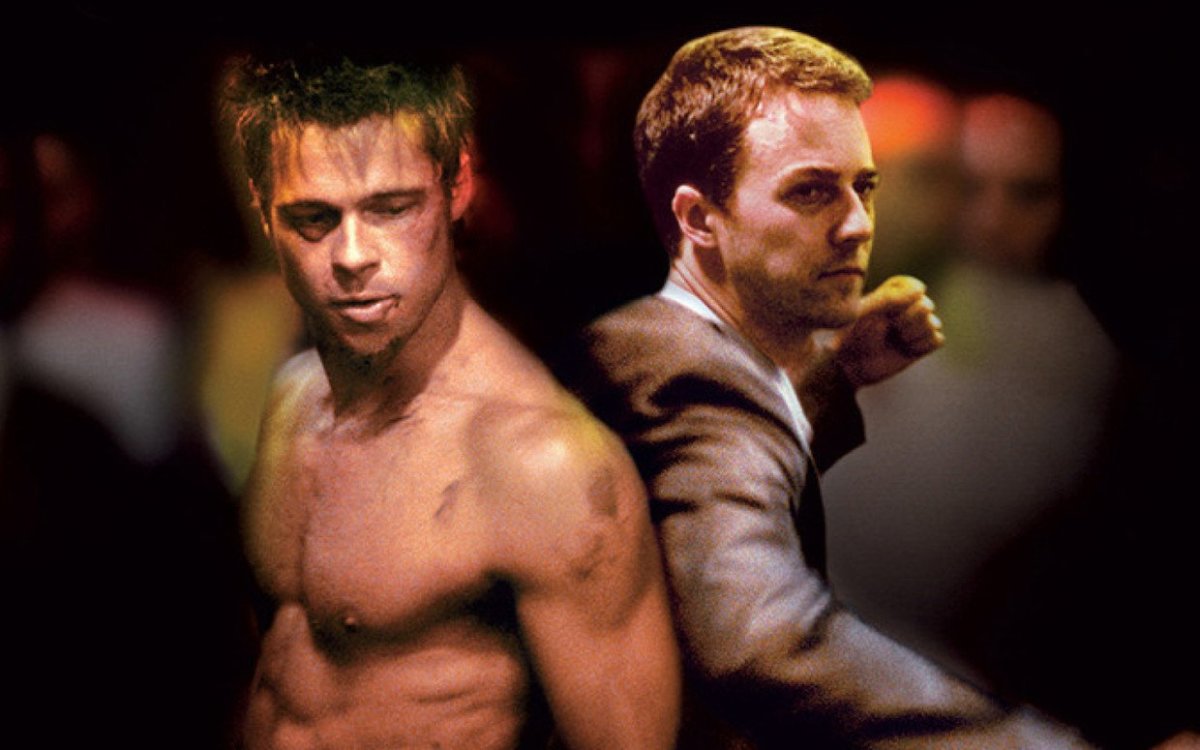
Legacy and Relevance
Brad Pitt’s role in Fight Club not only solidified his position as one of Hollywood’s leading actors but also showcased his willingness to take on challenging and unconventional roles. The film’s enduring popularity is a testament to its impact, with lines like “The first rule of Fight Club is: You do not talk about Fight Club” becoming ingrained in popular culture. Its critique of consumerism and its exploration of identity and masculinity remain relevant, reflecting ongoing societal struggles with these issues.
Conclusion
In Fight Club, Brad Pitt delivered one of his most memorable and impactful performances. The film’s blend of dark humor, philosophical inquiry, and visceral action, combined with Pitt’s portrayal of Tyler Durden, creates a cinematic experience that continues to captivate and provoke audiences. It stands as a pivotal film in Pitt’s career and a defining work of late 20th-century cinema, challenging viewers to question their values, their identities, and the very fabric of the society in which they live.

As we reflect on Fight Club and its place in Brad Pitt’s filmography, it’s clear that the movie is more than just a story about underground fighting; it’s a multi-layered exploration of the human condition. Pitt’s performance is central to this exploration, offering a glimpse into the potential for both destruction and enlightenment that lies within us all.
2. Se7en (1995) – A Gritty Exploration of Sin and Redemption
Se7en, directed by David Fincher and released in 1995, is a psychological thriller that delves into the dark corners of the human psyche, exploring themes of sin, despair, and the possibility of redemption. Brad Pitt stars as Detective David Mills, a young and idealistic homicide detective who finds himself partnered with the seasoned and world-weary Detective William Somerset, played by Morgan Freeman. Together, they investigate a series of gruesome murders, each inspired by one of the seven deadly sins. Pitt’s performance in Se7en is a critical turning point in his career, showcasing his ability to take on more serious and complex roles.
The Complexity of Detective David Mills
Brad Pitt’s portrayal of Detective Mills provides a compelling contrast to Freeman’s Detective Somerset. Mills is hot-headed, impulsive, and driven by a strong sense of justice, qualities that Pitt embodies with a palpable intensity. His journey throughout the film, from a somewhat naive idealist to a man confronted with the very depths of human depravity, is a testament to Pitt’s range as an actor. The dynamic between Mills and Somerset is at the heart of Se7en, with Pitt and Freeman delivering performances that bring depth and nuance to their characters’ respective worldviews.
A Dark and Stylish Thriller
Se7en is renowned for its atmospheric direction and stylish cinematography, which create a rain-soaked, foreboding urban landscape that serves as the perfect backdrop for the film’s dark themes. Pitt’s performance is integral to this setting; his character’s determination and eventual despair mirror the film’s exploration of sin and the human capacity for evil. The meticulous and symbolic nature of the murders in Se7en challenges both detectives and Pitt’s character, in particular, to confront his morality and the limits of his idealism.
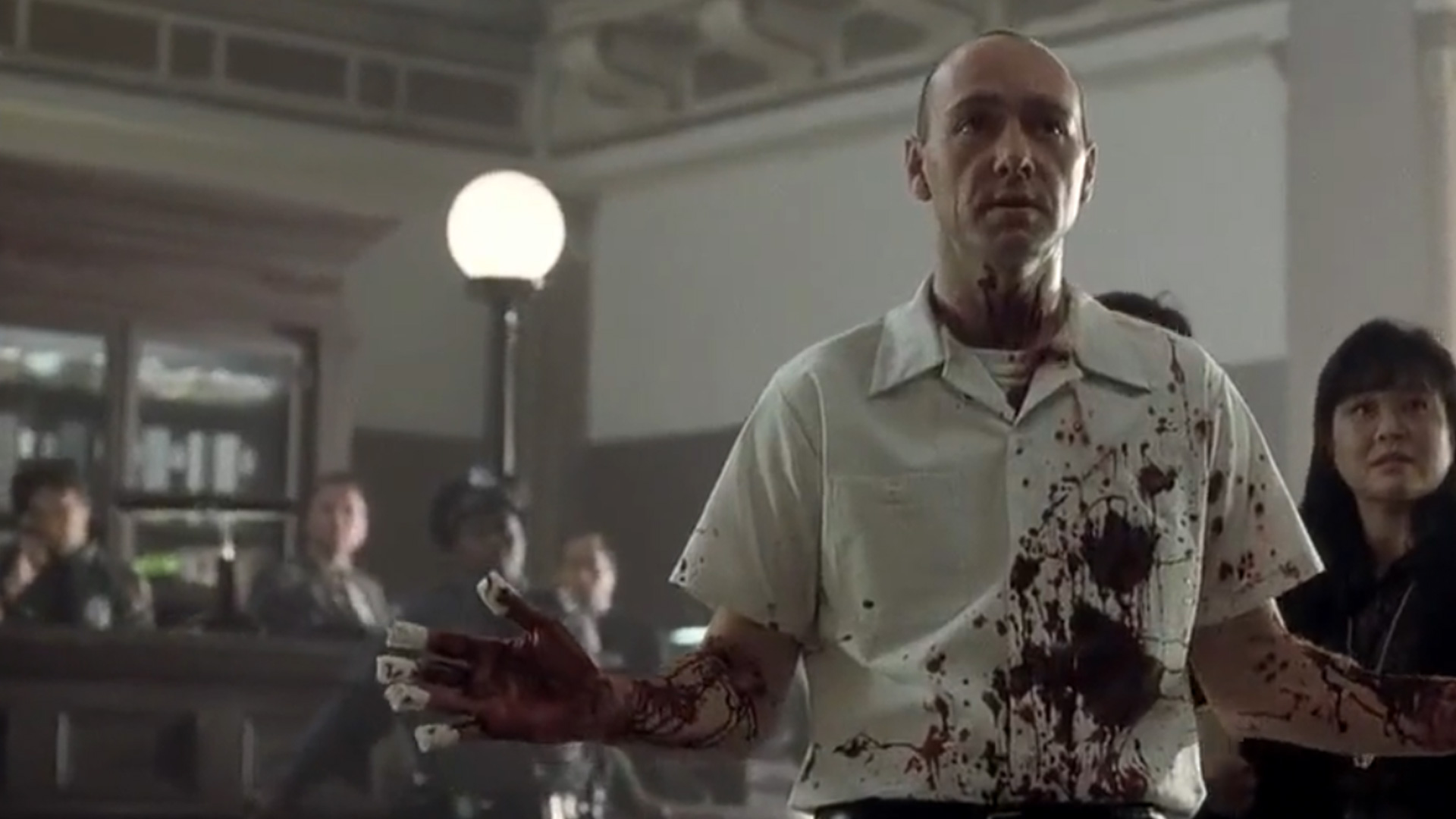
The Impact of Se7en
Upon its release, Se7en was both a critical and commercial success, praised for its innovative storytelling, direction, and strong performances. The film’s shocking and bleak ending, which we won’t spoil here, was particularly noted for its emotional impact and has been widely discussed and analyzed.
Pitt’s role in the film was a critical factor in its success, earning him acclaim for his depth and vulnerability. Se7en not only cemented Fincher’s reputation as a master filmmaker but also demonstrated Pitt’s versatility and commitment to challenging, thought-provoking roles.
Legacy and Continued Relevance
The legacy of Se7en extends beyond its initial impact. The film has been influential in shaping the thriller genre with its combination of psychological depth, visual style, and narrative boldness. Brad Pitt’s performance, in particular, has been highlighted as a key element of the film’s enduring appeal.
The themes of Se7en – the nature of evil, the struggle for redemption, and the question of justice in an unjust world – remain as relevant today as they were at the time of the film’s release.
Conclusion
In Se7en, Brad Pitt delivers a compelling performance that showcases his ability to engage with complex characters and themes. The film stands as a pivotal work in his career, highlighting his range as an actor and his willingness to explore the darker aspects of the human experience.
Through Detective Mills, Pitt brings to life the film’s exploration of sin and redemption, providing audiences with a character that is both relatable and deeply flawed. Se7en remains a landmark film in the thriller genre, and Pitt’s role is a significant part of its legacy.

As we have delved into the gritty world of Se7en, examining the complexities of sin, justice, and human nature, we see how Brad Pitt’s performances in films like Se7en and Fight Club have contributed to his status as one of the most versatile actors of his generation.
3. 12 Years a Slave (2013) – A Harrowing Journey into America’s Past
12 Years a Slave, directed by Steve McQueen and released in 2013, is a powerful and unflinching portrayal of slavery in the United States. Based on the autobiography of Solomon Northup, a free black man who was kidnapped and sold into slavery in the 19th century, the film is a stark reminder of America’s darkest historical chapters. Brad Pitt plays a small but pivotal role as Samuel Bass, a Canadian carpenter who holds abolitionist beliefs and plays a crucial role in Northup’s journey toward freedom.
Brad Pitt’s Role in “12 Years a Slave”
While Pitt’s screen time is limited in 12 Years a Slave, his role as Samuel Bass is significant. Bass represents a glimmer of hope in the otherwise brutal and unforgiving world that Northup is forced to navigate. Pitt’s portrayal is nuanced and compassionate, providing a stark contrast to the cruelty and inhumanity depicted throughout the film.
His character’s interactions with Northup, played by Chiwetel Ejiofor, are key moments that set the stage for the film’s resolution. Pitt’s involvement in the project extended beyond his on-screen role; he also served as a producer, which was instrumental in getting the film made.
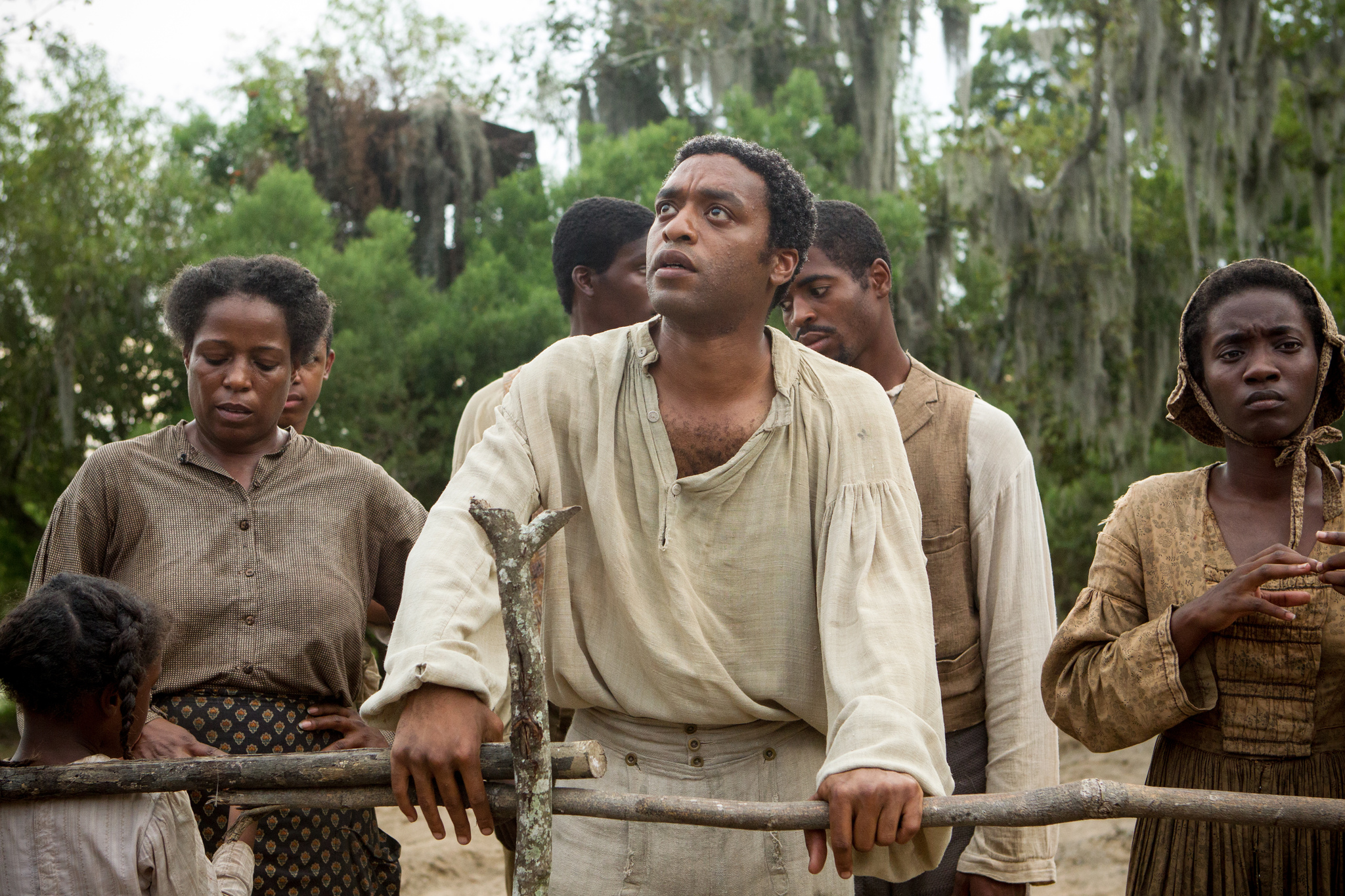
The Impact of “12 Years a Slave”
The film’s impact goes beyond its accolades; 12 Years a Slave sparked important conversations about race, history, and the legacy of slavery in America. It serves as a critical tool for education and awareness, challenging viewers to confront the realities of America’s past and consider its lasting effects on the present. Pitt’s role in the film, both on and off-screen, highlights his dedication to storytelling that contributes to social awareness and change.
Brad Pitt’s Contribution to the Film’s Legacy
Brad Pitt’s participation in 12 Years a Slave is a testament to his versatility as an actor and his vision as a producer. His performance, though brief, adds a significant layer to the film’s narrative, embodying the film’s themes of empathy and justice. As a producer, Pitt’s commitment to bringing Northup’s story to a contemporary audience underscores his belief in the power of cinema to enlighten, educate, and inspire change.
Conclusion
12 Years a Slave stands as a monumental film in the canon of American cinema, and Brad Pitt’s contributions, both in front of and behind the camera, are integral to its success. Through his portrayal of Samuel Bass and his role as a producer, Pitt demonstrates a profound commitment to storytelling that addresses critical issues and sheds light on untold stories.
The film’s portrayal of Solomon Northup’s life and struggles offers a moving and necessary reflection on the history of slavery in America, with Pitt’s performance providing a pivotal moment in Northup’s journey to freedom.

Brad Pitt’s diverse filmography showcases his range as an actor and his dedication to meaningful cinema. From the gritty realism of Se7en to the philosophical depths of Fight Club and the historical significance of 12 Years a Slave, Pitt continues to leave an indelible mark on the film industry.
4. Once Upon a Time in Hollywood (2019) – A Nostalgic Journey Through Tinseltown
Once Upon a Time in Hollywood, directed by Quentin Tarantino and released in 2019, is a love letter to the golden age of Hollywood, blending historical fact with fiction in a unique and engaging narrative.
Set in 1969 Los Angeles, the film follows the lives of aging actor Rick Dalton (Leonardo DiCaprio) and his stunt double and best friend, Cliff Booth, played by Brad Pitt. Pitt’s portrayal of Booth, a laid-back, tough-as-nails stuntman with a mysterious past, earned him critical acclaim, including his first acting Oscar for Best Supporting Actor.
Brad Pitt as Cliff Booth
Cliff Booth is arguably one of Brad Pitt’s most memorable roles, embodying the quintessential cool and charismatic persona Pitt is known for while also displaying a complex depth beneath his laid-back exterior. Pitt’s portrayal of Booth is a masterclass in subtlety and charm, capturing the essence of a bygone era with his effortless charisma and quiet intensity. Booth’s relationship with Dalton provides the emotional core of the film, showcasing the bond between the two men as they navigate the changing landscape of Hollywood.
The Cultural Impact
Once Upon a Time in Hollywood was both a critical and commercial success, praised for its direction, screenplay, and performances, particularly those of DiCaprio and Pitt. The film’s nostalgic look at Hollywood, combined with its unique blend of humor, drama, and suspense, resonated with audiences and critics alike. Pitt’s performance, in particular, was lauded for adding depth and nuance to the film, cementing Cliff Booth as one of the most iconic characters in Tarantino’s filmography.

The Legacy of Cliff Booth
Brad Pitt’s role in Once Upon a Time in Hollywood is significant not only for its critical acclaim but also for its contribution to Pitt’s legacy as an actor. His portrayal of Cliff Booth is a reminder of Pitt’s versatility and his ability to bring complexity and nuance to seemingly straightforward roles. The character of Booth, with his mix of affability, loyalty, and underlying danger, showcases Pitt’s skill at blending charisma with depth, making him one of the most compelling figures in recent cinema.
Conclusion
Once Upon a Time in Hollywood stands as a testament to Brad Pitt’s enduring appeal and talent as an actor. His portrayal of Cliff Booth is a highlight of the film, offering a nuanced and captivating performance that earned Pitt his first acting Oscar.
The film itself is a nostalgic journey through the final moments of Hollywood’s golden age, with Pitt’s performance embodying the spirit of a bygone era of cinema. Through Cliff Booth, Pitt delivers a performance that is both a tribute to the stuntmen of Hollywood and a reflection on the industry’s evolution, cementing his status as one of the most versatile actors of his generation.

As we reflect on the nostalgic and evocative narrative of Once Upon a Time in Hollywood and Brad Pitt’s role within it, we’re reminded of the power of cinema to capture and celebrate moments in time, even as it entertains and enlightens.
5. The Curious Case of Benjamin Button (2008) – A Timeless Tale of Life in Reverse
The Curious Case of Benjamin Button, directed by David Fincher and released in 2008, is a film adaptation of F. Scott Fitzgerald’s 1922 short story. It presents a fantasy drama about a man who ages in reverse. Brad Pitt stars as Benjamin Button, delivering a performance that spans the breadth of human experience, from the frailties of old age to the innocence of youth. Pitt’s portrayal is nuanced and deeply moving, earning him an Academy Award nomination for Best Actor.
Brad Pitt’s Transformation as Benjamin Button
Pitt’s role required a transformative performance, both physically and emotionally, as he depicted Benjamin Button’s unique journey through life. The film’s groundbreaking visual effects allowed Pitt to appear as both an elderly man and a young child, but he could convey the emotional depth and complexity of Button’s experiences that truly brought the character to life. Pitt’s portrayal is a poignant exploration of love, loss, and the human condition, offering a reflective look at how time shapes our lives.
A Visual and Narrative Masterpiece
David Fincher’s direction, combined with the film’s innovative use of CGI, created a visually stunning backdrop for Benjamin Button’s story. The narrative unfolds in a non-linear fashion, mirroring the unconventional path of Button’s life, and Pitt’s performance anchors the film’s exploration of time and memory. The Curious Case of Benjamin Button challenges viewers to consider the impermanence of life and the importance of cherishing every moment.
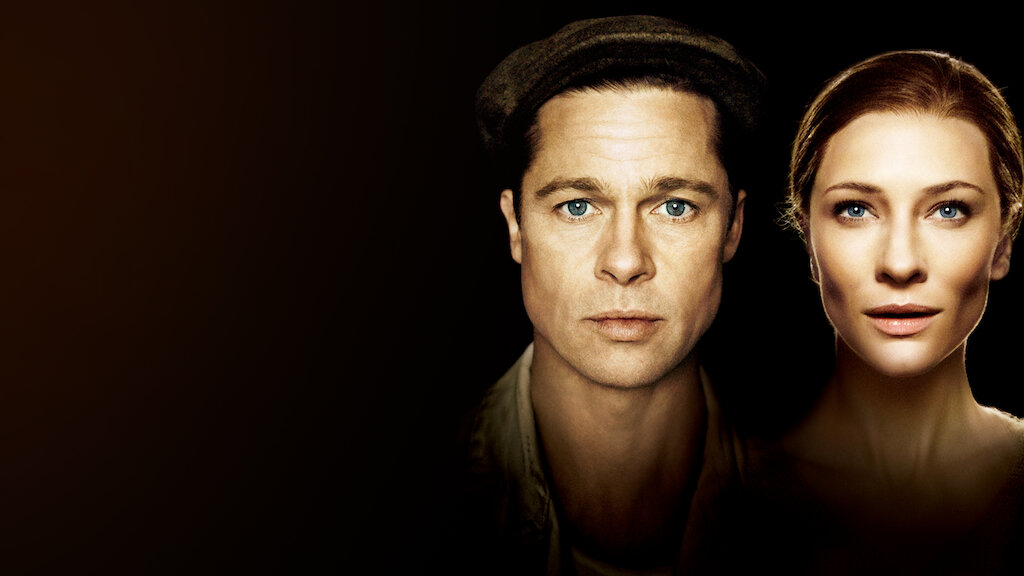
Critical and Commercial Success
The Curious Case of Benjamin Button was met with widespread acclaim and celebrated for its storytelling, visual effects, and Pitt’s performance. The film received thirteen Academy Award nominations and won three, showcasing its impact across multiple aspects of filmmaking. Pitt’s role in the film was particularly noted for its emotional depth and the physical demands of portraying a character who lives a lifetime in reverse.
Conclusion
The Curious Case of Benjamin Button stands as a significant film in Brad Pitt’s career, highlighting his range as an actor and his ability to engage with deeply philosophical and emotional material. Pitt’s transformation into Benjamin Button showcases not only the technical achievements of modern cinema but also the timeless nature of storytelling. Through this role, Pitt invites audiences to ponder the mysteries of life, love, and the inevitable passage of time.

Brad Pitt’s performance in The Curious Case of Benjamin Button is a powerful reminder of the actor’s versatility and commitment to challenging roles. The film itself is a beautiful and thought-provoking journey that remains relevant for its exploration of universal themes, further cementing Pitt’s legacy as one of the most talented actors of his generation.
6. Moneyball (2011) – Reinventing the Game of Baseball
Moneyball, directed by Bennett Miller and released in 2011, is based on Michael Lewis’s 2003 non-fiction book “Moneyball: The Art of Winning an Unfair Game.” The film chronicles the true story of Billy Beane (Brad Pitt), the general manager of the Oakland Athletics baseball team, and his revolutionary approach to assembling a competitive team despite the organization’s limited budget. Pitt’s portrayal of Beane is both charismatic and deeply introspective, earning him critical acclaim and an Academy Award nomination for Best Actor.
Brad Pitt as Billy Beane
In Moneyball, Pitt brings to life the frustration, determination, and innovative thinking of Billy Beane. His performance captures the essence of a man challenging the conventions of Major League Baseball. Pitt’s Beane is not just a sports manager but a visionary, using statistical analysis (sabermetrics) to identify undervalued players. This role required Pitt to convey a wide range of emotions, from the highs of success to the lows of personal and professional setbacks, showcasing his ability to inhabit complex characters fully.
The Impact of Moneyball
Moneyball was hailed for its intelligent script, direction, and performances, particularly Pitt’s lead role. The film’s success lies in its ability to transcend the sports genre, appealing to audiences with little interest in baseball through its exploration of themes such as innovation, resilience, and the challenge of changing an entrenched system. Moneyball is as much about the emotional journey of Billy Beane as it is about the game of baseball, offering a compelling narrative that resonates with a wide range of viewers.
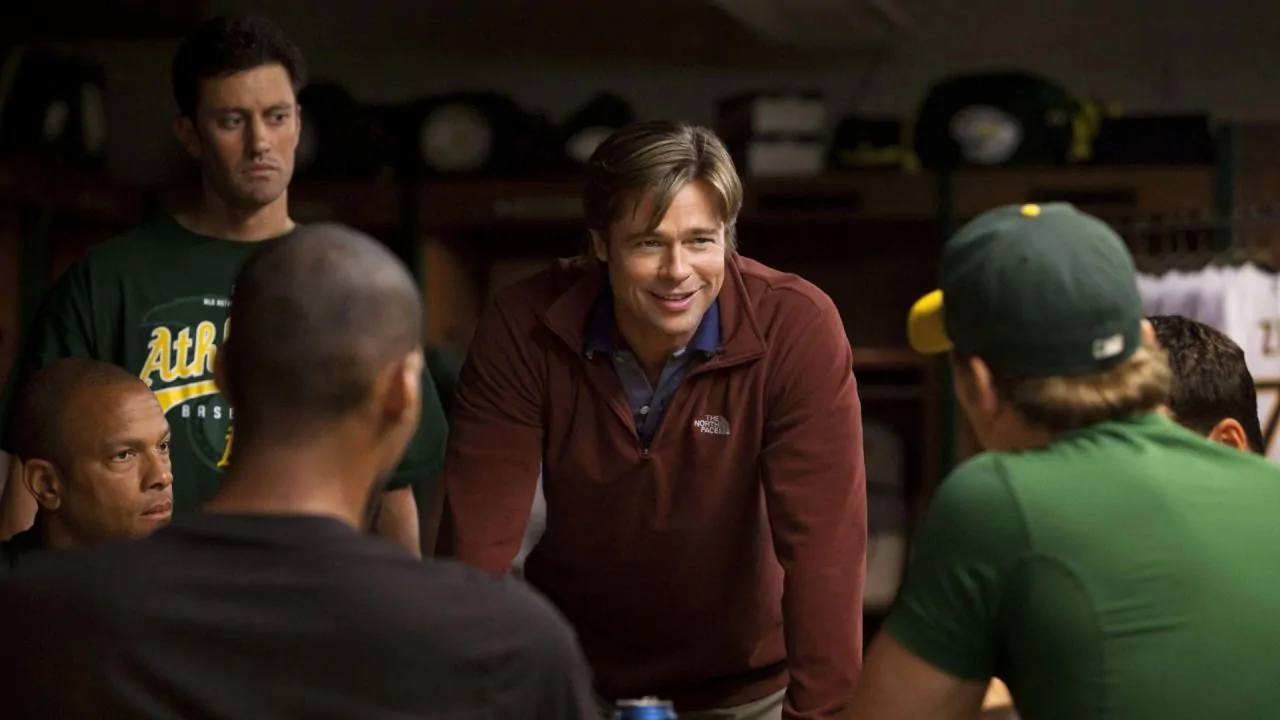
A New Perspective on Baseball
The film’s approach to telling the story of the Oakland A’s 2002 season brought a fresh perspective to the sports movie genre. By focusing on the behind-the-scenes strategy and the use of analytics, Moneyball highlights the cerebral aspects of baseball, often overshadowed by the physical prowess displayed on the field. Pitt’s portrayal of Beane humanizes the struggle to innovate within a tradition-bound industry, making the film’s message universally applicable.
Conclusion
Moneyball stands out in Brad Pitt’s filmography as a testament to his skills as an actor and his ability to choose roles that resonate with audiences on multiple levels. Through his portrayal of Billy Beane, Pitt explores themes of innovation, challenge, and resilience, offering an inspiring and thought-provoking narrative that extends beyond the baseball diamond. The film’s success is a tribute to Pitt’s compelling performance and his contribution to a story that challenges conventional wisdom and celebrates the spirit of reinvention.

Brad Pitt’s portrayal of Billy Beane in Moneyball is a highlight of his career, showcasing his range as an actor and his commitment to telling stories that inspire and provoke thought. The film itself remains a significant work, not only for its contribution to the sports genre but also for its exploration of broader themes relevant to any field or endeavor.
7. Inglourious Basterds (2009) – A Bold Reimagining of History
Inglourious Basterds, directed by Quentin Tarantino and released in 2009, is a daring and stylistic take on World War II, blending historical fiction with Tarantino’s unique brand of storytelling.
Brad Pitt stars as Lieutenant Aldo Raine, the charismatic and ruthless leader of a group of Jewish-American guerrilla soldiers tasked with spreading fear through the Nazi ranks by scalping and brutally killing Nazis. Pitt’s performance is both commanding and humorously eccentric, embodying the film’s blend of intense drama and dark comedy.
Brad Pitt as Lieutenant Aldo Raine
In Inglourious Basterds, Pitt’s portrayal of Aldo Raine is unforgettable. With a thick Tennessee accent and a scar marking his neck, Pitt’s Raine is both fearsome and oddly charming. He delivers Tarantino’s sharp dialogue with a gusto that brings both levity and intensity to the film.
Brad Pitt’s ability to navigate the tonal shifts of the movie—balancing moments of high tension with comedic relief—is a testament to his skill as an actor. His character’s relentless pursuit of justice, or perhaps vengeance, against the Nazis adds a complex layer to the film’s exploration of morality and retribution.
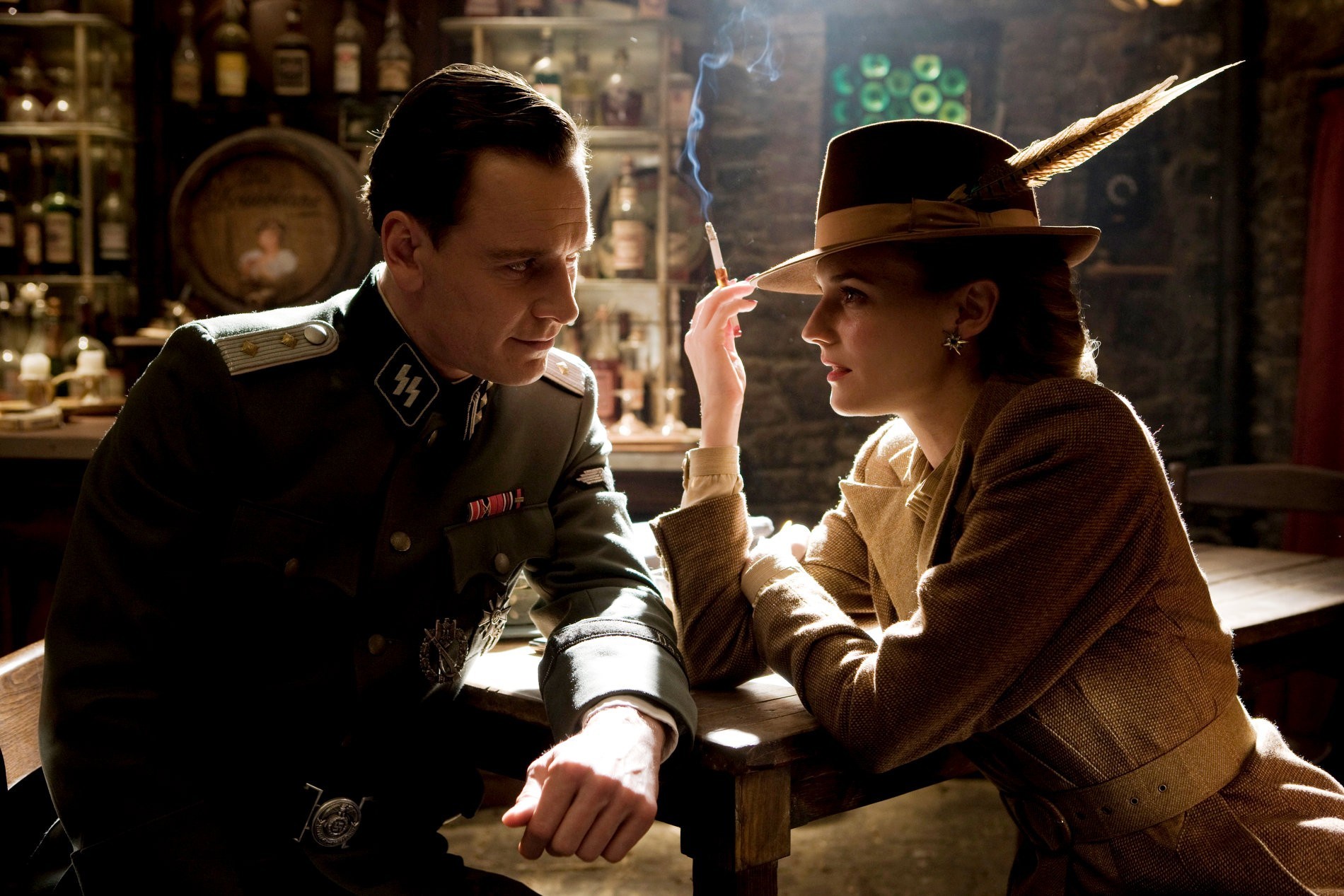
A Tarantino Masterpiece
Inglourious Basterds is celebrated for its audacious rewriting of historical events, presenting a fictionalized account of Nazi Germany’s downfall that is both satisfying and thought-provoking. Tarantino’s signature style—comprising sharp dialogue, nonlinear storytelling, and graphic violence—is on full display, with Pitt’s performance anchoring the film’s ambitious narrative. The ensemble cast, including Christoph Waltz, Mélanie Laurent, and Eli Roth, delivers memorable performances, but it’s Pitt’s portrayal of the fearless and unorthodox Raine that stands out as a highlight.
The Impact of the Film
Upon its release, Inglourious Basterds was both a critical and commercial success, praised for its originality, direction, and performances. The film’s revisionist approach to history, coupled with Tarantino’s stylistic flourishes, sparked discussions about the power of cinema to reshape narratives and confront historical atrocities. Pitt’s role was widely acclaimed, showcasing his ability to lead a diverse cast and bring a larger-than-life character to the screen with charisma and depth.
Conclusion
Inglourious Basterds stands as a significant work in Brad Pitt’s career, highlighting his versatility as an actor and his ability to engage with complex material. As Lieutenant Aldo Raine, Pitt delivers a performance that is both entertaining and thought-provoking, embodying the film’s exploration of vengeance, heroism, and the rewriting of history. His collaboration with Tarantino on this film showcases a perfect melding of actor and material, resulting in a memorable and impactful cinematic experience.

Brad Pitt’s role in Inglourious Basterds demonstrates his capacity for transforming into distinctly unique characters, further establishing him as one of the most dynamic and compelling actors of his generation.
8. Ocean’s Eleven (2001) – The Heist Film Redefined
Ocean’s Eleven, directed by Steven Soderbergh and released in 2001, revitalized the heist genre with its suave execution, witty banter, and star-studded ensemble cast. Brad Pitt stars as Rusty Ryan, right-hand man to George Clooney’s Danny Ocean, in this stylish and sophisticated caper about a group planning to rob three Las Vegas casinos simultaneously. Pitt’s portrayal of Rusty is effortlessly cool and impeccably dressed, often seen teaching poker to celebrities or munching on fast food, contributing significantly to the film’s charm and humor.
Brad Pitt as Rusty Ryan
Rusty Ryan is a character that showcases Pitt’s ability to blend into an ensemble while still standing out with his charismatic presence. His chemistry with Clooney’s Ocean is palpable, providing the backbone for the film’s narrative and its comedic moments. Pitt’s performance is nuanced, with Rusty often acting as the voice of reason amidst the crew’s ambitious plans. His laid-back demeanor and sharp wit make Rusty a memorable character in a film filled with standout performances.
A Modern Heist Classic
Ocean’s Eleven is celebrated for its clever script, dynamic direction, and the seamless interplay among its cast. Soderbergh’s film is both an homage to and a reinvention of the heist genre, balancing high-stakes drama with lighthearted comedy.
The heist itself is a marvel of planning and execution, with Pitt’s Rusty playing a crucial role in its orchestration. The film’s success lies in its ability to entertain and engage audiences with its smart pacing, intricate plot twists, and charismatic performances.
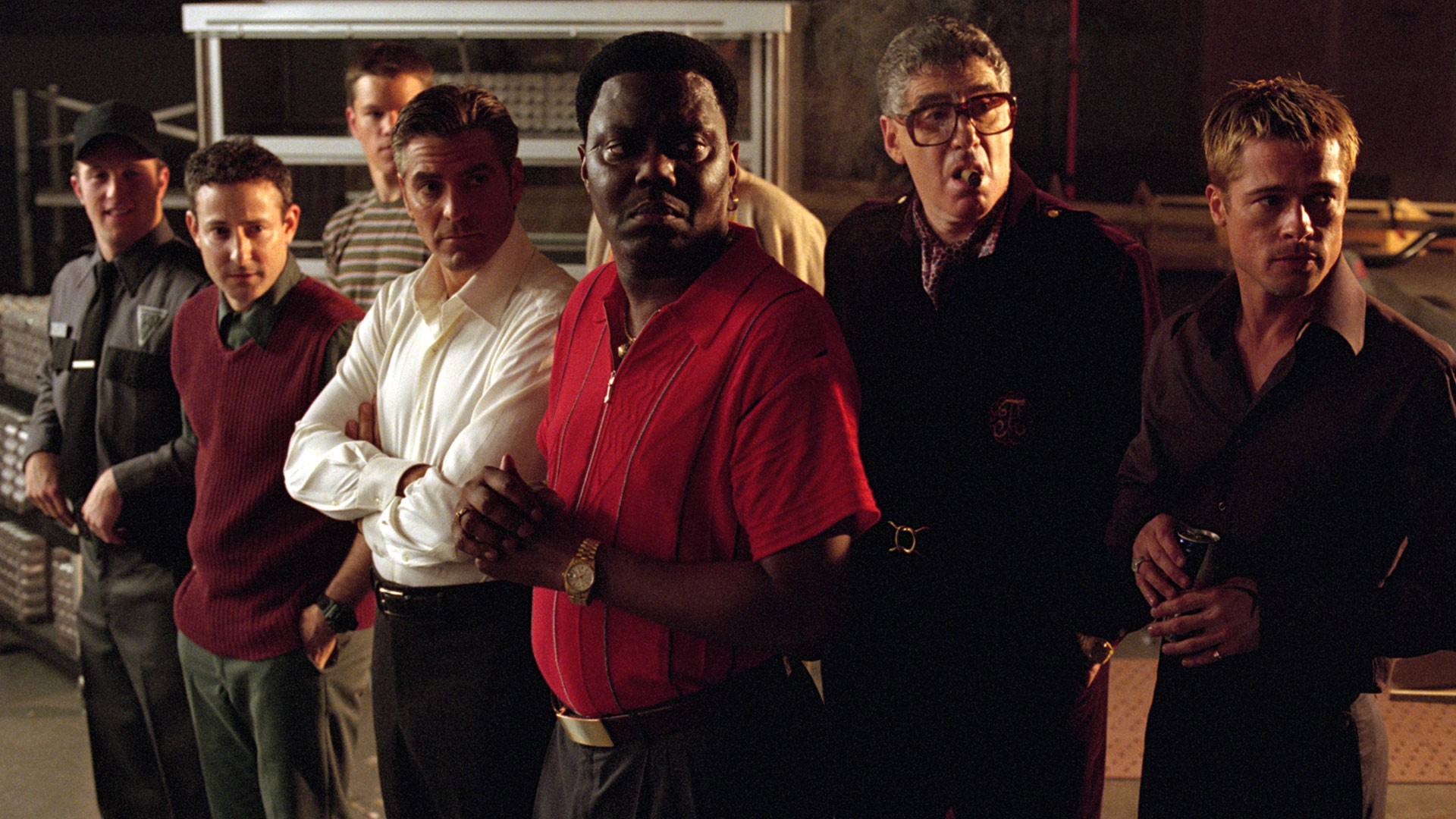
The Cultural Impact
Upon its release, Ocean’s Eleven became an instant classic, praised for its refreshing take on the heist narrative and its visual style. It spawned two sequels, creating a beloved trilogy that expanded on the characters and their exploits. Pitt’s role as Rusty Ryan became iconic, encapsulating the early 2000s era of cool, sophisticated cinema. The film’s influence extends beyond its immediate success, inspiring a new generation of heist films and television shows.
Conclusion
Ocean’s Eleven stands as a highlight in Brad Pitt’s filmography, showcasing his knack for choosing roles that play to his strengths while allowing him to explore different facets of his craft. As Rusty Ryan, Pitt delivers a performance that is both entertaining and integral to the film’s success, solidifying his status as one of Hollywood’s most charismatic and engaging actors. Ocean’s Eleven not only redefined the heist genre but also established a new standard for ensemble films, with Pitt’s role exemplifying the perfect blend of style, humor, and sophistication.

Brad Pitt’s contribution to Ocean’s Eleven and its legacy demonstrates his ability to impact a film both on and off the screen, reinforcing his place in the pantheon of great contemporary actors.
9. Babel (2006) – A Tapestry of Interconnected Stories
Babel, directed by Alejandro González Iñárritu and released in 2006, is a poignant exploration of miscommunication, grief, and the interconnectedness of human experiences across different cultures. The film weaves together four separate stories set in Morocco, Mexico, Japan, and the United States, showing how a single event can have far-reaching implications.
Brad Pitt stars as Richard Jones, an American tourist vacationing in Morocco with his wife, Susan (Cate Blanchett), when tragedy strikes. Pitt’s portrayal of Richard is one of desperation, vulnerability, and determination, offering a deeply human perspective on the film’s themes.
Brad Pitt as Richard Jones
In Babel, Pitt delivers one of his most nuanced performances. Richard navigates a complex emotional landscape, grappling with the immediate crisis of his wife’s accidental shooting and the broader implications of their situation in a foreign country. Pitt conveys a sense of urgency and helplessness that anchors the film’s Moroccan storyline, highlighting the challenges of communication and the struggle to maintain hope in dire circumstances. His performance is a testament to his ability to embody characters facing profound personal and moral dilemmas.
A Global Narrative
Babel is celebrated for its ambitious storytelling and Iñárritu’s direction, which captures the beauty and tragedy of human connection across language and cultural barriers. The film’s narrative structure, interlacing stories from around the globe, showcases the complexity of global interconnectedness.
Pitt’s role is crucial to this narrative, as his character’s actions and experiences are pivotal to the film’s exploration of the consequences of miscommunication and the shared human condition.
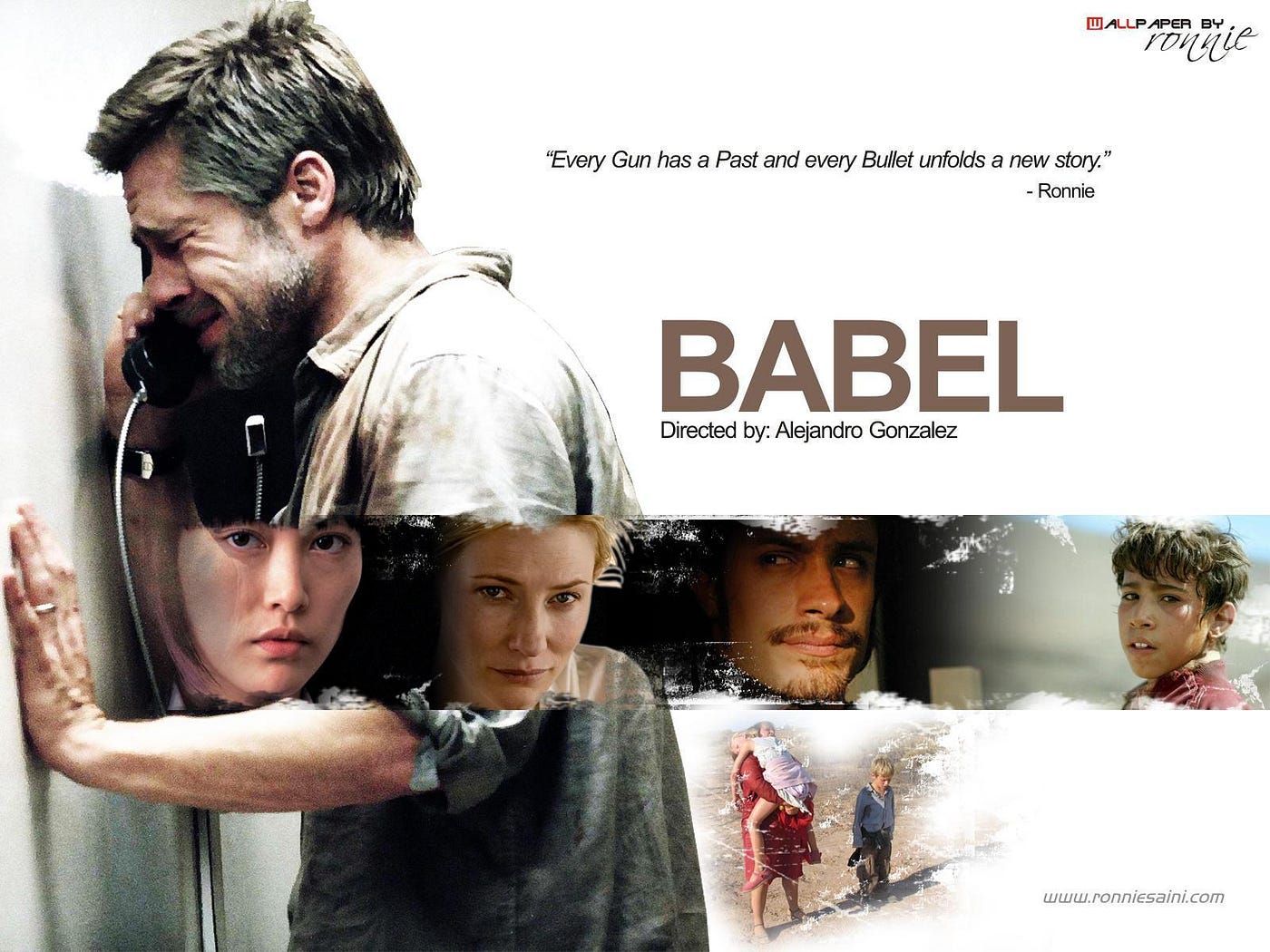
Critical Reception and Impact
Upon its release, Babel received widespread acclaim for its storytelling, cinematography, and performances, especially those of Pitt and Blanchett. The film was nominated for seven Academy Awards, including Best Picture, and won for Best Original Score. Babel’s impact lies in its ability to humanize global issues, encouraging empathy and understanding across cultural divides. Pitt’s performance was lauded for adding depth to the film’s exploration of love, loss, and the desperate search for connection.
Conclusion
Babel represents a pivotal moment in Brad Pitt’s career, showcasing his capacity for dramatic roles that require a delicate balance of strength and vulnerability. His portrayal of Richard Jones is a compelling exploration of the human condition, set against the backdrop of a global narrative that challenges viewers to consider their place in the world’s tapestry of stories. Through Babel, Pitt demonstrates his versatility as an actor and his commitment to films that offer a profound commentary on the human experience.

Brad Pitt’s performance in Babel is a key component of the film’s success, reinforcing his reputation as an actor capable of tackling complex roles in challenging narratives. Babel remains a significant work in contemporary cinema, with Pitt’s contribution highlighting the power of nuanced storytelling in bridging cultural and communicative divides.
10. Snatch (2000) – A Cult Classic of Crime and Comedy
Snatch, directed by Guy Ritchie and released in 2000, is a fast-paced, darkly comedic crime film that quickly became a cult classic. It weaves together multiple storylines involving unscrupulous boxers, Jewish jewelers, and an 86-carat diamond. Brad Pitt stars as Mickey O’Neil, a wildly unpredictable and unintelligible Irish Traveller and bare-knuckle boxer. Pitt’s performance is a standout, showcasing his comedic timing, physicality, and ability to fully immerse himself in a character vastly different from those he had portrayed previously.
Brad Pitt as Mickey O’Neil
Pitt’s portrayal of Mickey O’Neil is both hilarious and captivating. Speaking in a nearly indecipherable accent, Pitt’s character becomes the film’s wild card, defying expectations at every turn.
His performance is a testament to his versatility as an actor, managing to convey depth and emotion even while playing a largely comedic character. Mickey’s unpredictability and resilience make him a fan favorite, and Pitt’s embodiment of these traits is a highlight of the film.
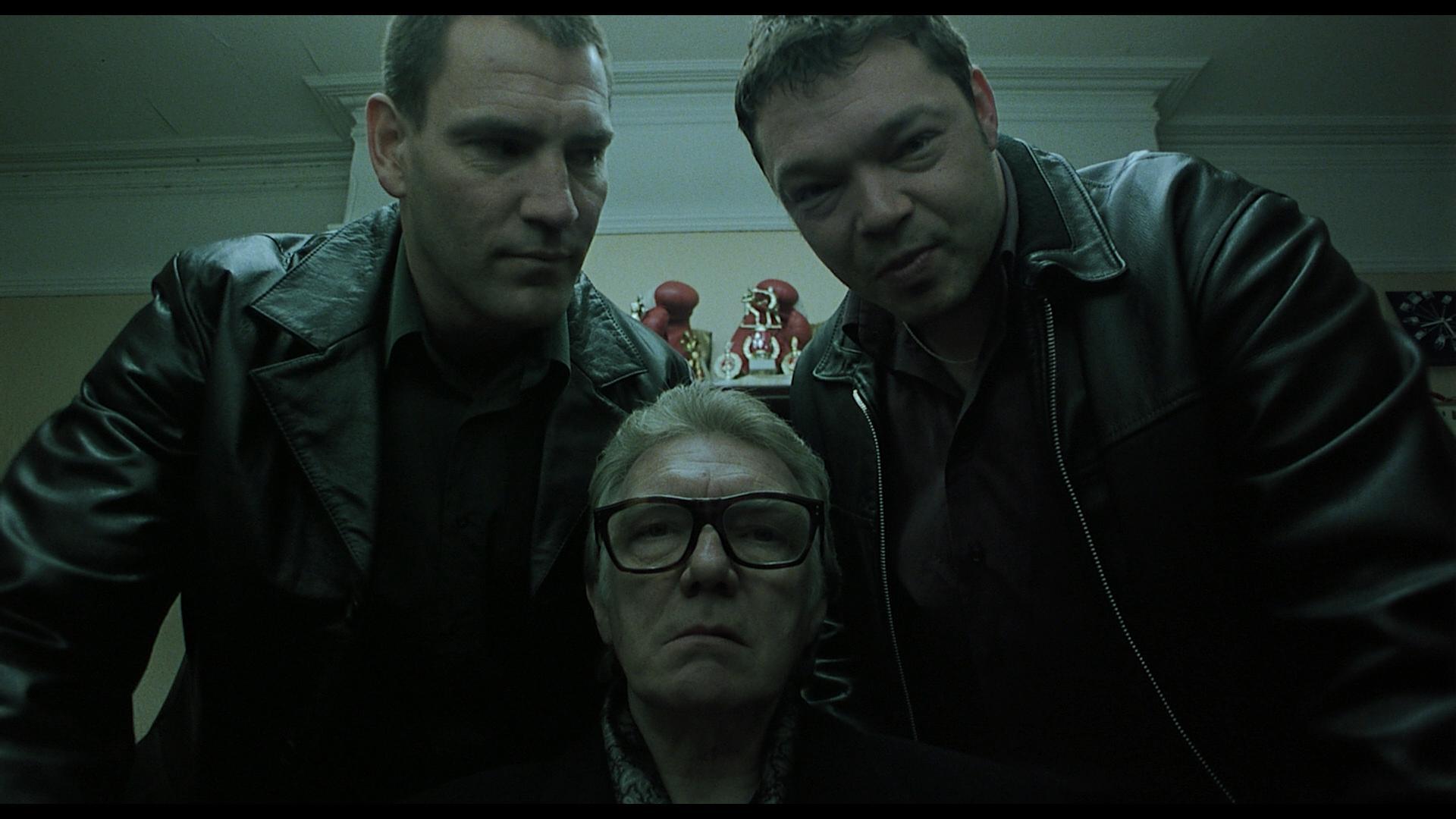
A Stylish Ensemble Film
Snatch is renowned for its quick wit, dynamic editing, and eclectic cast, including Jason Statham, Benicio Del Toro, and Dennis Farina, among others. The film’s narrative is complex, with Ritchie’s signature style of interlocking stories and rapid-fire dialogue driving the action forward.
Brad Pitt’s role within this ensemble is crucial; Mickey serves as both a catalyst for much of the plot’s development and a source of comic relief. His interactions with the other characters bring a unique energy to the film, enhancing its fast-paced and frenetic atmosphere.
The Impact of Snatch
Upon its release, Snatch was both a critical and commercial success, praised for its sharp script, direction, and performances. The film has since gained a loyal following, celebrated for its unique blend of crime, comedy, and a touch of absurdity. Pitt’s performance, in particular, was singled out for praise, with many citing it as one of the most memorable aspects of the movie. Snatch has endured as a favorite among fans of the genre, thanks in no small part to Pitt’s unforgettable turn as Mickey O’Neil.

Legacy and Continued Popularity
The legacy of Snatch lies in its ability to balance humor, action, and a bit of heart amidst the chaos of its criminal underworld. Brad Pitt’s performance is emblematic of the film’s charm, demonstrating his willingness to take on unconventional roles and excel in them. Snatch remains a touchstone of early 2000s cinema, reflective of a period when filmmakers like Ritchie were redefining genre boundaries with flair and originality.
In Conclusion
Brad Pitt, whose career spans several decades, stands as a testament to his enduring appeal and versatility as an actor. With a filmography that encompasses a broad range of genres—from the psychological depths of Se7en to the nostalgic charm of Once Upon a Time in Hollywood and the innovative narrative of Moneyball—Pitt has consistently showcased his ability to adapt to and excel in diverse roles.
His performances, characterized by their depth, intensity, and complexity, have garnered both critical acclaim and commercial success, affirming his status as one of Hollywood’s most respected talents.
Pitt’s journey through cinema is marked by a deliberate choice of roles that challenge conventional storytelling, whether through the exploration of human psychology, the intricacies of historical events, or the subtleties of personal relationships.
His portrayal of characters such as the enigmatic Tyler Durden in Fight Club, the cunning Rusty Ryan in Ocean’s Eleven, and the resilient Billy Beane in Moneyball highlight his range and commitment to the craft of acting. These characters, each distinct and memorable, showcase Pitt’s ability to convey a wide spectrum of human emotions and experiences, making him a relatable and compelling presence on screen.

Beyond his performances, Pitt’s influence extends to his work as a producer, where he has been instrumental in bringing to life stories that provoke thought and conversation. His dedication to the art of storytelling is evident in the projects he chooses to support, often focusing on themes of significance and relevance to contemporary society. This aspect of his career underscores a deeper understanding of cinema’s power to reflect, critique, and inspire.
Brad Pitt’s legacy in the film industry is not merely a collection of successful movies but a reflection of a career dedicated to exploring the human condition in all its complexity. Through his diverse roles, Pitt invites audiences to explore themes of love, loss, ambition, and redemption, providing a window into the myriad ways in which we connect.
His contributions to cinema, marked by a body of work that continues to inspire and captivate, have cemented his status as a luminary in Hollywood, whose impact on the industry and audiences around the world will be felt for years to come.









